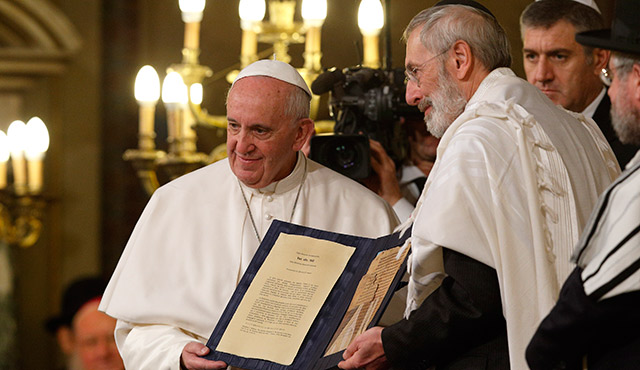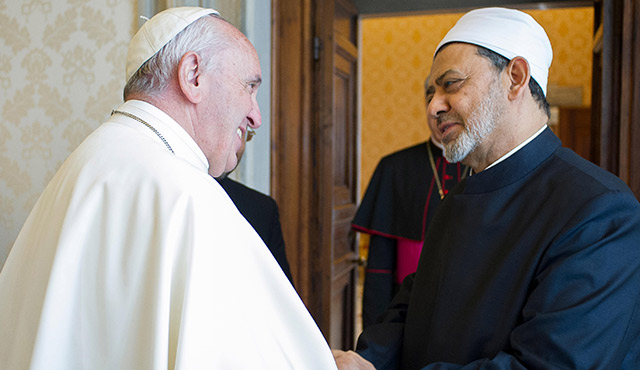In spite of many distinct differences in the details between Judaism, Christianity and Islam, these very disparate faiths also share many common elements.
“If you really study the world religions objectively like a scientist or sociologist, overall you would see that there are more close similarities between Judaism, Christianity and Islam — although there are big differences — but there are more similarities between the three, and there are fewer similarities or slightly more differences with the other eastern world religions,” says Father Felix Just, S.J., executive director of the Loyola Institute for Spirituality in Orange.
The two most basic commonalities are that all three are monotheistic and also share a common spiritual ancestor.
“All three religions can be traced back to Abraham himself,” says Father Quan Tran, parochial vicar for the Office of Ecumenical and Interreligious Affairs for the Diocese. “Abraham is considered the father of the faith, so all [Christianity, Judaism and Islam] are considered Abrahamic faiths.”
Abraham rejected the worshipping of false idols and polytheism that was common during his time.
“When we talk about God, there is one God that we can all agree on,” says Father Just. “For Judaism and Islam, that one God is the one and only God and cannot be distinguished further. Whereas with Christians, one God is a community of persons made up of the Father, Son and Holy Spirit.”
Father Just regularly teaches in the Catholic Bible Institutes of the Archdiocese of Los Angeles, the Diocese of San Bernardino and the Diocese of Orange.
Each of the three belief systems can also agree on the concept of revelation.
“All three believe that God communicates to the world,” explains Father Just. “That God reveals his will to human beings over the course of time through prophets who speak on behalf of God. The prophets are the spokespersons for God.”
Furthermore, all three believe in a prophecy that has been written down. The Abrahamic religions are also sometimes referred to as the religions of the book.
“Each have some written scriptures that are very foundational,” says Father Just. “All believe in prophecy and written scriptures, but which scripture and which prophet is where disagreement exists. Other religions also use written texts but they aren’t valued in quite the same way as being the revelation of God as in the three religions.”
The three Abrahamic faiths also share a belief in a personable God through prayer.
“All three agree that we approach God with our praise and petition and thanksgiving. The rituals are different in the details but the bigger overall structure is that they all include some kind of use of scripture,” says Father Just.
Also important in all three religions is the concept of fasting and feasting. Most Christians fast during Lent and have a great celebration on Easter. The Jews fast during Yom Kippur and also have great feast days that involve the sharing of food like the Passover meal. Muslims fast during Ramadan and celebrate with great feasts at the end of their fasting. However, the details on the reason for fasting and what are celebrated and for how long are different with each religion.
Each of the religions also emphasize the famous Golden Rule: Do unto others, as you would have them do unto you. In addition, charity is also an important element among the three faiths.
Another commonality is the belief in spiritual beings that act as intercessors between humans and God.
“Most Jews, most Christians and most Muslims believe in angels in the sense of there being other intermediary spiritual beings,” says Father Just.
The role of women in religion is also very important among the faiths.
“In particular, Christianity and Islam highly value Mary,” says Father Just. “Mary is named most frequently in the entire Quran, more than any of the women around the time of Mohammed. She is the most revered as a woman of faith. Although Mary is not as revered in Judaism, other similar women of faith in the Old Testament are valued as well.”
Despite the dramatic differences in religious beliefs, there are many more to add to the list of commonalities among the Abrahamic religions.
“I think a lot of times we tend to focus on what makes us different rather than what unites us,” says Father Tran, whose office serves as a resource to Bishop Vann and the Diocese in an ongoing dialogue with Christian churches and non-Christian religions in the community. “There’s something different about each of us, something unique about our religion, our practice, our faith and we tend to focus on that rather than what we have in common. We forget that we have more in common than we do that divides us.”


